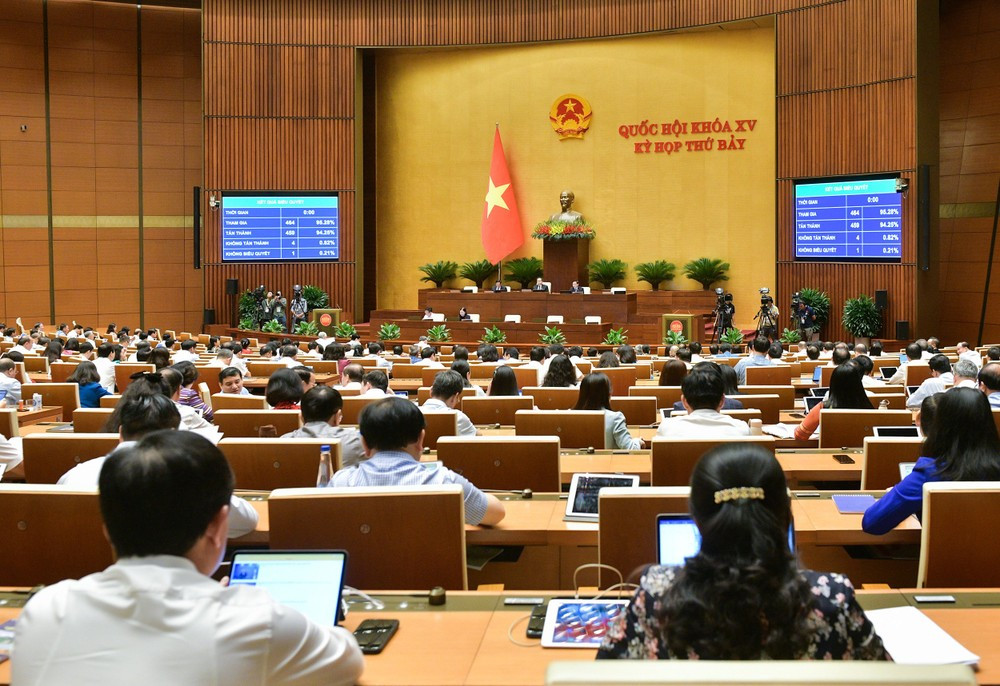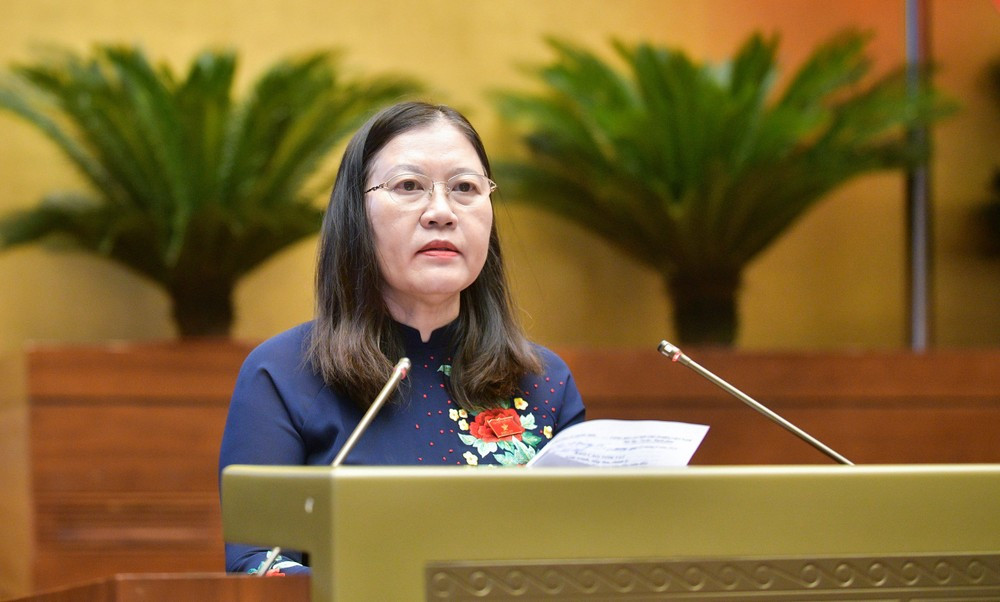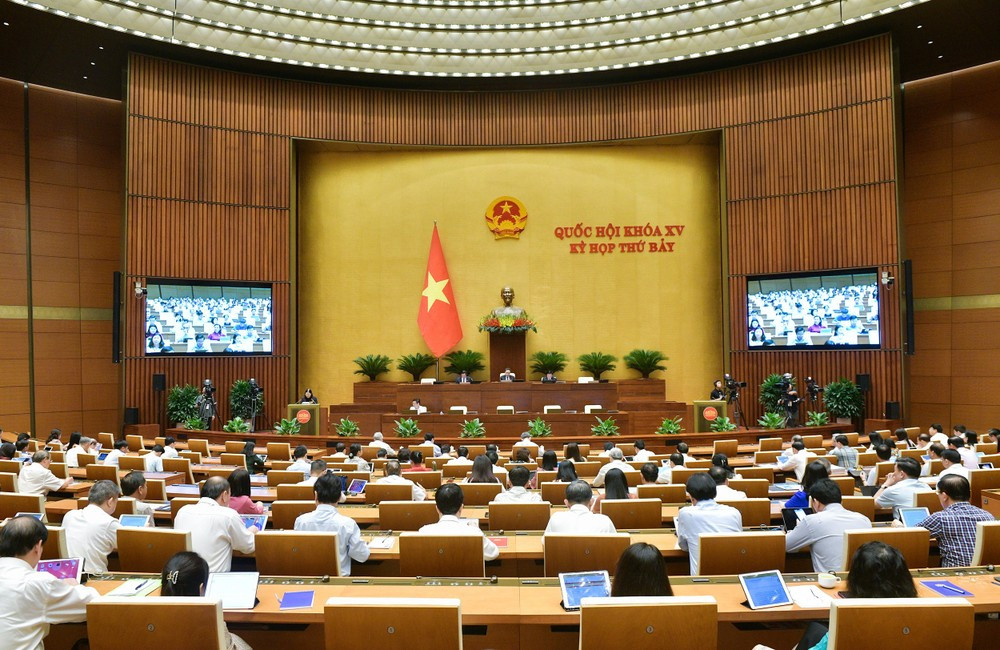This morning, June 24, in the first working session of the week, with 459 delegates voting in favor (accounting for 94.25%), the National Assembly officially passed the draft Law on Organization of People's Courts (amended).

After listening to the Chairwoman of the National Assembly's Judicial Committee Le Thi Nga present the Report on explanation, acceptance and revision of the draft Law on Organization of People's Courts (amended), the National Assembly voted to pass this draft law by electronic voting.
According to the electronic voting results, 464 delegates participated in the vote (accounting for 95.28%), of which 459 delegates voted in favor (accounting for 94.25%), 4 delegates did not approve, and 1 delegate did not vote. Thus, with the majority of delegates participating in the vote in favor, the National Assembly officially passed the draft Law on Organization of People's Courts (amended).
Previously, presenting the Report at the meeting, Chairwoman of the National Assembly's Judicial Committee Le Thi Nga said that the National Assembly Standing Committee had a full Report No. 879/BC-UBTVQH15 dated June 22, 2024 explaining, accepting, and revising the draft Law on Organization of People's Courts (amended) to submit to the National Assembly for consideration and approval to send to National Assembly deputies.
In Official Dispatch No. 102/TANDTC-PC dated June 20, 2024, the Supreme People's Court agreed with the entire content of the draft Law and commented on the draft Report on explanation, acceptance and revision of the draft Law on the content of collecting documents and evidence.
Regarding the reform of the provincial People's Court and the district People's Court according to the jurisdiction (Clause 1, Article 4), due to different opinions, the National Assembly Standing Committee directed the development of two options and asked for the opinions of the National Assembly deputies by ballot. Specifically, option 1: maintain the provisions of the current Law on the provincial People's Court and the district People's Court; option 2: reform the provincial People's Court into the appellate People's Court, the district People's Court into the first instance People's Court.

As a result, no plan was approved by more than half of the total number of National Assembly deputies. After consulting with National Assembly deputies, Chairwoman of the National Assembly's Judicial Committee Le Thi Nga said that the Supreme People's Court and the Standing Committee of the Judicial Committee unanimously proposed to accept the majority of National Assembly deputies who had voted, and continue to maintain the regulations on provincial-level People's Courts and district-level People's Courts as in the current Law.
According to Chairwoman of the Judiciary Committee Le Thi Nga Thuc, the current requirements of Resolution No. 27, "issues that require practicality, are clear, have been proven correct by practice, and have high consensus, will be resolutely implemented; issues that are unclear, and have many different opinions, will continue to be studied... The National Assembly Standing Committee finds that the provisions of the draft Law on Provincial People's Courts and District People's Courts are appropriate...
Regarding the specialized People's Court of First Instance (Point d, Clause 1, Article 4; Section 5, Chapter IV), Chairwoman of the National Assembly's Judicial Committee Le Thi Nga said that after considering the necessity, political, legal and practical basis, and opinions of many National Assembly deputies, the National Assembly's Judicial Committee agreed to establish the specialized People's Court of First Instance as in the draft Law submitted to the National Assembly for consideration and decision.
Regarding the establishment of departments at the High People's Court on the basis of reorganizing the Director and Inspection Departments (Point d, Clause 1, Article 51), Chairwoman of the National Assembly's Judicial Committee Le Thi Nga stated that the establishment of departments at the High People's Court is to upgrade a number of department-level units to suit the nature and quantity of work that these units are undertaking, in order to improve capacity and ensure the completion of the tasks of the advisory unit. Therefore, the establishment of departments on the basis of reorganizing the Director and Inspection Departments is necessary.

Regarding participation and information activities at court sessions and meetings (Clause 3, Article 141), the draft law has been revised: allowing recording of the entire proceedings of the court session and meeting; video recording is only allowed during the opening of the court session, meeting, and the pronouncement of judgment and announcement of decisions.
The above recording and videotaping must have the consent of the Chairman of the trial, meeting, and relevant persons as prescribed (Clause 3). At the same time, in case it is necessary to serve professional tasks, the Court shall record and videotape the proceedings of the trial or meeting; the use and provision of the results of the recording and videotape by the Court shall be carried out in accordance with the provisions of law and the Chief Justice of the Supreme People's Court shall stipulate in detail (Clause 4).
In addition to the above contents, the draft Law on Organization of People's Courts (amended) has received and revised other specific contents as stated in the Report on explanation, reception and revision (full version) and the draft Law.
Regarding the Supreme People's Court's comments on the "draft Report on explanation, acceptance and revision" on the content of collecting documents and evidence, they have been considered and accepted in sub-section 2, section I of the full Report.
After receiving and completing, the draft Law submitted to the National Assembly for consideration and approval consists of 09 chapters with 152 Articles.
VN (synthesis)